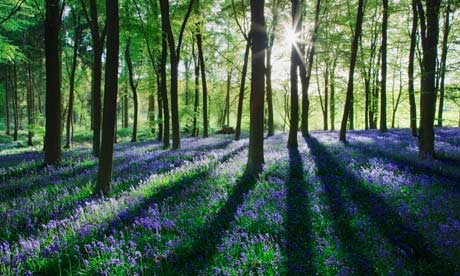Few things are as bewitching as an English bluebell wood in the spring, with a carpet of shimmering flowers turning the light blue under the trees, and the air laden with scent.
But daytrippers hoping for a sight of bluebell woods this Easter may be disappointed, as the drought that brought a hosepipe ban into effect for 20 million people also means bluebells are less abundant than usual.
All over the south and east of England, woods are suffering the effects of the worst drought in three decades, which, while bringing the peak bluebell flowering forward to the bank holidays, has also impaired their growth.
Matthew Oates, a naturalist for the National Trust, said: "The warm and dry weather of the last few weeks has sped up the flowering process for bluebells, but the absence of rain means that visitors will need to be quick to see them – it could be a short but sweet season for bluebells and other classic spring plants like the primrose. The bluebell starts growing in January with its sole purpose to flower before the other woodland plants, but in dry conditions the bluebell will flower less, will be less abundant and its growth will be stunted."
On the plus side for trippers, the flowers that do appear are likely to be more sweet-smelling than usual.
Easter weekend is likely to be the peak time to see bluebells in the south of England, according to Oates, although the best displays may be available on higher ground and north-facing slopes that flower later.
The damaging effects of the drought on bluebell woods may be mirrored soon in the effect on domestic gardens, given the hosepipe ban that came into force at midnight on Wednesday for residents in seven water company regions.
Although many people are likely to flout the ban – one third of people affected intend to keep using their hosepipes, according to some research – they may find their neighbours turning against them as the extent of the drought takes its toll on wildlife. Conservation groups have called on people to obey the restrictions as a matter of conscience, in order to preserve water for wildlife and nature at risk from the water shortages.
The RSPB urged people to save water where possible, because the knock-on effects on birds can be devastating. As water companies and farmers need to abstract water from rivers in order to maintain supplies and keep crops growing, less is available for streams, wetlands and other areas where wildlife normally flourishes.
Phil Burston, RSPB water policy officer, said: "This hosepipe ban is an essential part of dealing with a crisis which could be devastating for wildlife in our countryside. Reducing demand now will help keep more water in the environment, keeping rivers flowing for longer and protecting their precious wildlife."
He warned that this year's drought, which follows two winters of low rainfall, could be even worse than that of 1976.
Other effects seen in 1976, such as rising prices for food as crop yields fall, and even for beer as brewers face restrictions, are also likely this summer.
Businesses must also play their part, the Environment Agency insisted . Trevor Bishop, the head of water resources, said: "Hosepipe bans are an effective way to cut overall water use – but they are not a silver bullet. While households have a very important role to play in helping to cut water use during the current drought, businesses, farmers and water companies must all play their part too, by using water wisely to ensure that the water we do have goes further."
Companies are being plied with information on how to save money by cutting their water use.
This includes basic measures such as fixing leaky taps and having cars washed and windows cleaned less often, to more complex technology such as systems to recycle waste water and grey water – for instance, catching and reusing water used in industrial processes, and recycling water used for cleaning for low-grade purposes such as flushing toilets.
More could be done, said Rose Timlett of the conservation group WWF. She said water meters, efficiency kits, rewards for saving water and on-off restrictions could cut nearly one third from water demand.
"Hosepipe bans are currently necessary, but they're a quick fix and won't solve the problems long-term," she said. "Unless the government does more and with a greater sense of urgency, we might face the consequences of losing unique wildlife in the not-too-distant future."











